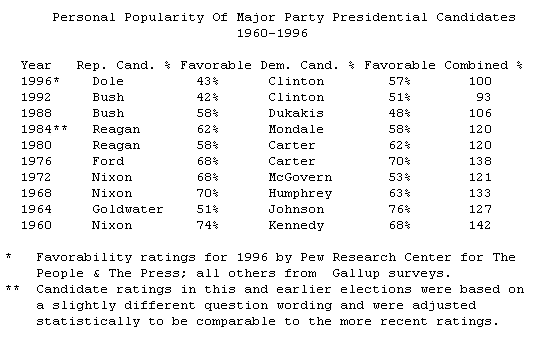As the 1996 election campaign draws to an end, Bob Dole rates as one of the least appealing major party presidential candidates of almost four decades, according to an analysis of favorability ratings by Larry Hugick, director of political surveys at Princeton Survey Research Associates. He ranks 19th out of 20 candidates since 1960.
Bill Clinton’s current favorability rating, at 57%, is about average for a major party candidate. But Dole’s, at 43%, is lower than Democratic candidate Michael Dukakis’ 48% when he lost in 1988, and on a par with President George Bush’s 42% when he lost in 1992. Clinton has had the good fortune of running against the two lowest rated presidential candidates in the past forty years.
Dole’s poor showing appears to reflect in part the unpopularity of the Republican 104th Congress. Dole’s favorability ratings dropped between 1994, before the GOP took control of Congress, and the end of 1995. His ratings fell further after he became the putative GOP nominee in early spring, perhaps because voters came to see him as not understanding the problems of average Americans and as not likable personally.
Bush received only 38% of the popular vote in his bid for reelection. Democrat George McGovern and Republican Barry Goldwater also received only about 40% of the vote when they lost, but each rated considerably higher in personal favorability (53% and 51%, respectively). The candidates with the highest favorability won the elections with two exceptions: Richard Nixon had a higher rating than John F. Kennedy (74% vs. 64%) when he lost in 1960, and Jimmy Carter rated higher than Ronald Reagan (62% vs. 58%) when he lost in 1980.
The following table of these ratings also shows that the combined favorability standings of the two major candidates have been lower during the last three presidential campaigns than in all previous elections for which data is available. It may be that voters feel freer today than in past generations to criticize personally and hold in disfavor a man running for the presidency of the United States. Whatever the reason, the last candidate to reach 60% favorability was Reagan in 1984, and the last one to reach 70% was Carter in 1976. These figures are consistent with declining public confidence in institutions in the post-Watergate, post-Vietnam era.





